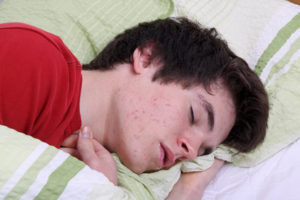We spend a third of lives doing it. It’s vital to our health and wellbeing. And yet we don’t always pay enough attention to why we need it!
The answer of course is sleep – something that every single one of us does without giving too much thought to just how important good sleep is to how well we cope with everyday life.
 Sleep, regardless of age, is extremely important to a healthy lifestyle and should not be taken lightly. It is a basic and fundamental human requirement and has restorative functions. As we sleep, tissue grows and repairs itself and the immune system is strengthened. The brain also repairs itself during sleep and researchers believe sleep is critical to healthy brain function. In fact, researchers also believe the brain performs actions vital to learning and memory during sleep. Sleep also affects the levels of hormones and other important chemicals circulating in your body. Getting too little sleep disrupts all of that.
Sleep, regardless of age, is extremely important to a healthy lifestyle and should not be taken lightly. It is a basic and fundamental human requirement and has restorative functions. As we sleep, tissue grows and repairs itself and the immune system is strengthened. The brain also repairs itself during sleep and researchers believe sleep is critical to healthy brain function. In fact, researchers also believe the brain performs actions vital to learning and memory during sleep. Sleep also affects the levels of hormones and other important chemicals circulating in your body. Getting too little sleep disrupts all of that.
People go to huge amounts of time and expense to eat well and exercise regularly but without a good night’s sleep all that effort will be in vain. Sleep doesn’t just make us feel better, it can improve our health by decreasing the risk of heart attacks, diabetes, strokes and it helps us fight off minor ailments, deal better with depression and even tackle weight problems.
One size doesn’t fit all
There is no magic number for sleep, and while everyone’s requirements are different (some of us cope far better on less than others), there is a fairly general consensus that around seven to nine hours is the average. If you’re getting a little less, there’s probably no need to worry about it, but a lot less could lead to problems.
Research has found that those who frequently get fewer than six hours a night are at significantly increased risk of stroke and heart disease, with evidence that not sleeping enough may ramp up the ‘fight or flight’ response to stress, releasing hormones that speed up heart rate and raise blood pressure. Not only are there increased health risks with routinely sleeping less than six hours but it also impacts on attention, concentration and memory.
Achieving a good night’s sleep is a problem for an awful lot of people, in particular the elderly or those who suffer with a medical condition or disability, but there are all sorts of practical things that can be done to improve sleep quality.
How to get a better night’s sleep
To ensure you experience good sleep it’s essential to follow good lifestyle habits and to eliminate the factors that are causing you disturbed sleep. Try following the three Rs – regular hours, routine and the right environment. Routines that are associated with sleep signal the brain that it’s time to wind down – think a warm bath, having a milky drink, reading a book or listening to soothing music. Meditation is a great tool to help calm our minds down and relax our bodies. If you’re the sort of person who starts to worry when you get into bed or makes ‘to do’ lists in your head, try writing down the things you need to tackle – you can deal with those in the morning after a good night’s sleep! Avoid screen time, and that includes the TV, at least an hour before bedtime.
Try to keep similar hours too. It’s important to establish a regular sleep pattern – going to bed and waking up at roughly the same time – as it helps to programme the body to sleep better.
Make sure your sleeping environment is restful. Your bedroom should be kept for rest and sleep and it should be neither too hot, nor too cold; and as quiet and dark as possible. In darkness, your body releases a hormone called melatonin that relaxes your body helping you to drift off. Make sure the room is gadget free and your bed is comfortable. It’s difficult to get deep, restful sleep on one that’s too soft, too hard, too small or too old.
Seek out ways to improve your lifestyle – small changes can have a huge impact on your sleep quality and quantity. Overhaul your diet, caffeine and alcohol consumption and exercise regime. Too much alcohol, especially late at night, can play havoc with sleep patterns. Alcohol may help you fall asleep initially, but will interrupt your sleep later on in the night and it robs us of one of our most satisfying types of sleep, where dreams occur. Plus you will wake dehydrated and needing the loo!
Remember, a good night’s sleep makes you look better, feel better, behave better, perform better and think better! What more could you want.


Thank you Lisa for your first blog, we can definitely relate to a good nights sleep making you look and feel better and perform better, we will definitely be using the tips in the article! Thank you
on April 2, 2019 at 1:29 pm talkhealth